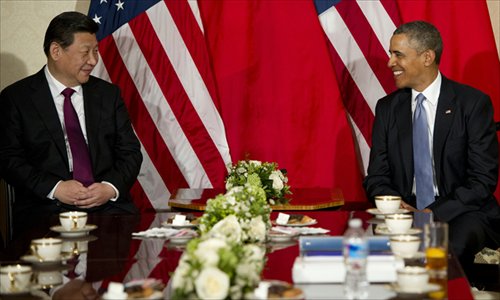Xi elaborates on nuclear security concept

Chinese President Xi Jinping (left) and US President Barack Obama meet at the US ambassador's residence in The Hague, Netherlands on Monday ahead of the Nuclear Security Summit. Photo: AFP
Chinese President Xi Jinping on Monday told the 3rd Nuclear Security Summit (NSS) China's stance on nuclear security, in the first elaboration of China's nuclear security concept.
The two-day NSS, which kicked off in The Hague on Monday, aims to prevent nuclear terrorism.
On the sidelines of the meeting, the crisis in Ukraine dominated, as US President Barack Obama tried to rally support for isolating Russia at his meeting with Xi and at the G7 meeting.
During the summit attended by leaders from more than 50 countries and international organizations, the Chinese president was expected to explain China's stance on nuclear security and present ideas for international cooperation in the field, according to Chinese foreign ministry officials.
The president would also introduce China's achievements and plans in strengthening nuclear security, and discuss cooperation with global leaders. The content of his speech was not released as of press time.
It is the first time that China has elaborated its nuclear security concept.
Shen Dingli, a professor with Fudan University in Shanghai, told the Global Times that compared with previous summits in Washington and Seoul, the 3rd NSS will stress more on agenda setting for nuclear security negotiations and build a clearer international order for nuclear security.
Compared with other nuclear-related issues, such as non-proliferation, "preventing nuclear terrorism is a topic that countries have no significant disagreements," Li Bin, a senior associate with the Carnegie Endowment for International Peace, told the Global Times on Monday.
According to Li, a lot of progress was achieved over the past two years, including removing highly enriched uranium (HEU) from some countries.
A report published by the Washington-based Nuclear Threat Initiative (NTI) earlier this year said nearly 2,000 metric tons of weapons-usable nuclear materials remain spread across hundreds of sites around the globe - some of it poorly secured.
To build a nuclear weapon, only about 16 kilograms of HEU or eight kilograms of plutonium are needed.
In order to minimize the risks of letting the materials fall into the wrong hands, Shen said countries at the meeting are expected to discuss a near-term plan to down-blend nuclear fuels used in research reactors.
"China has mastered the advanced technology, and has been providing it to other countries," he said.
The largest nuclear security center in the Asia-Pacific region, financed by China and the US, is expected to be up and running in 2015, reported the Xinhua News Agency. The report quoted Wang Yiren, vice chairman of the China Atomic Energy Authority, as saying that the center will be a regional hub for training and exchange.
On the sidelines of the NSS on Monday, Japan pledged to return hundreds of kilograms of weapons-grade uranium and plutonium given to Tokyo for research during the Cold War era, AFP reported.
Washington has been pressing Tokyo over the return of this material, which could be used to build dozens of nuclear weapons.
Meanwhile, ahead of the NSS, Xi met with Obama and discussed the building of a new type of major-country relations, the situation in Ukraine, denuclearization of the Korean Peninsula, maritime disputes and fighting climate change.
"I believe ultimately that by working together, China and the US can help strengthen international law, respect for the sovereignty of nations and establish the kind of rules, internationally, that allow all people to thrive," Obama said, alluding to the crisis in Ukraine.
Xi did not address the subject of Ukraine specifically but said there was "greater space where China and the US are cooperating," AFP reported.
Yu Wanli, a professor with the School of International Studies at Peking University, said that discussion over the Ukraine situation is "unavoidable," but China is unlikely to change its position and it's not going to take sides with either the West or Russia.
Obama also held crisis talks with other G7 leaders to seek a firm line against Russia. "We're united in imposing a cost on Russia for its actions so far," Obama said ahead of the G7 meeting, Reuters reported.
Agencies contributed to this story